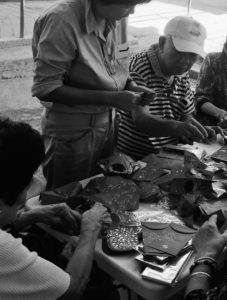Working is Therapeutic

We’ve heard about reminiscence therapy but most of us do not see work as a form of therapy. I like you to reflect on the following question for a minute. How much of your time have you spent on work in your whole life?
As a student, study equates to work. Upon your graduation, you join the workforce. Some of you eventually move on to be a home-maker or caregiver, with daily routines filled with many tasks and responsibilities.
Work serves many functions in one’s life. Firstly, it occupies the hours in a day, thereby cutting down boredom in one’s life [although some of you may be yearning for more free time in your day :)]. Secondly, work provides a structure to one’s life, such that one does not feel lost about what to do with one’s twenty-four hours every day. One forms (part of) his/her self-identity from work. It makes one feels useful, feels needed. Feeling useful or needed is an innate human need. It gives ones a sense of purpose every day, that you need to get up and get to work. Work also serves as an avenue for socialisation. When work is taken away from one’s life, all the above-mentioned would also be taken away. It leaves a person with a large void in life. People with a large void in life are usually unhappy and unmotivated. And this is true for a lot of people living with dementia. They are unhappy, and at times unmotivated to be engaged and to participate in life. They just let life passes them by, with the seconds ticking away. Giving work back to them – real grown-up work – equates to giving life back to them. This is not said by me, but it’s shared by clients of Apex Harmony Lodge.
In 2013, Apex Harmony Lodge launched its Therapy Through Work programme. The programme allows the participating residents to decide on the type of ‘work’ activities that he/she chooses to be engaged in. Support and adjustments will be provided to ensure that the residents will be able to carry out the work tasks successfully, tapping on their maximized capacity. This creates rich experiences for the participating residents, facilitating a vibrant and purposeful lifestyle for them. According to Apex Harmony Lodge, the uniquely enjoyable ‘work’ has successfully provided these residents reason to look forward to each new day as they felt empowered to participate and contribute to society. They see themselves as a valued person in society again. (Source: http://www.apexharmony.org.sg/living-at-lodge/therapy-through-work)
Work has given the residents structure in their life. Although they work only for a few hours once or twice each week, the participating residents now have something to look forward to in a week. Working occupies a few hours in a week of their lives. It gives them the opportunity to socialize with others and society again. It makes them feel useful – contributing members of the community. It enables them to feel like how they had felt throughout the most part of their lives. Working normalises life for them.
Dear readers, whether you are providing care to the person with dementia at home or in an institution, I urged you to start thinking of what work can you create for them- real grown-up, meaningful work – not just working with the puzzle pieces or beans. In a house-hold setting, such work can be playing the role as a parent again, asking them to give you a hug to make you, their child, feel better; putting the laundry to wash and fold them subsequently; or gardening if they are interested. In an institution setting, you may consider consigning simple and repetitive tasks into the institution for the clients to do. Just bear in mind that the work needs to consist of the following two elements: (1) Tasks that they enjoy (2) Concrete outcome/output – they are able to see the results of their efforts.